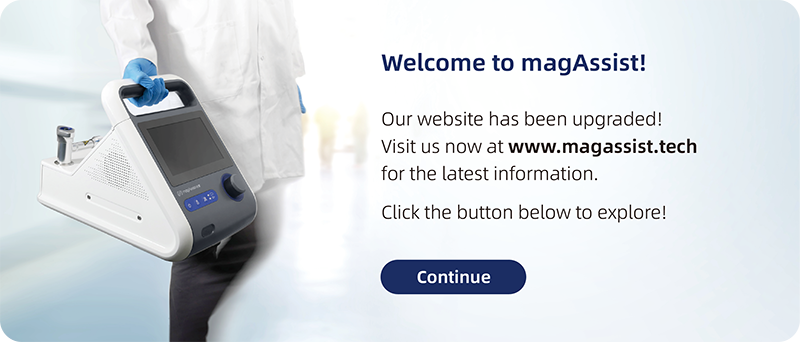magAssist's extracorporeal ventricular assist device Debuts at 2021 China International Heart Failure Conference
On July 10th, the 2021 China International Heart Failure Conference was successfully held. The conference was hosted by the Chinese Medical Doctor Association and the Heart Failure Committee of the Chinese Medical Doctor Association. And it was co-organized by National Centre for Cardiovascular Disease, Fuwai Hospital, Chinese Academy of Medical Sciences, National Cardiology Expert Committee Heart Failure Professional Committee, Chinese Medical Association Cardiovascular Disease Branch Heart Failure Group, Chinese Journal of Heart Failure and Cardiomyopathy, Heart Failure and Cardiomyopathy Network, Hainan Boao Medical Innovation Research Institute. Additionally, many top experts and physicians in the field of heart failure in China also participated and contributed online.

China International Heart Failure Congress 2021
This conference invited Professor Ping Li from the Department of Cardiac and Great Vascular Surgery of the Union Hospital Affiliated to Tongji Medical College of Huazhong University of Science and Technology (hereinafter referred to as: Wuhan Union Medical College Hospital). At the conference, Prof. Li shared the development and testing progress of the new short-term and mid-term extracorporeal ventricular assist device (Extra-VAD) jointly developed by Wuhan Union Medical College and magAssist.
Professor Li said that heart failure is a cardiovascular disease that has been on the rise for nearly 70 years in the world. Heart transplantation is the gold standard for the treatment of end-stage heart failure, but the shortage of donor hearts makes many end-stage heart failure patients needs effective treatment before heart transplantation. For patients with end-stage heart failure, drug therapy has little effect, during this period, mechanical circulatory support is necessary to help patients.
Patients with acute heart failure or cardiogenic shock who have received ineffective conventional treatments can be treated with short term mechanical circulatory support treatment. The use of mechanical circulatory support can maintain hemodynamic stability, ensure effective organ perfusion, improve cardiac function, and reduce cardiac load to prolong the patient's life, allowing a chance for further treatment.
magAssist's extracorporeal ventricular assist device
Key features are internationally comparable
The extracorporeal ventricular assist device (Extra-VAD) jointly developed by Wuhan Union Medical College Hospital and magAssist, is a fully magnetic levitation blood pump for short-term extracorporeal ventricular assist. Its key performances can be compared with Abbott's CentriMag, which is the only FDA and CE certified product in the world. And under the premise of the same blood compatibility, magAssist’s products are better to use.
ECMO plays an important role as a bridge in heart transplantation. It is the preferred mechanical circulatory support in the treatment of biventricular failure and respiratory failure. However, the current use of ECMO needs to be evaluated for its safety and efficacy and its application in the support treatment of acute heart failure, since problems such as anticoagulation and haemolysis could be seen. The existing weaning rate and discharge rate are not high, and the discharge survival rate varies between 20% to 80%.
Comparing with ECMO Circulation Assist Technology
Extracorporeal Ventricular assist device (Extra-VAD) has distinct advantages in the treatment of heart failure
• It doesn’t use membrane lung, which eliminates the complications and complications associated with the lung.
• The central intubation method also avoids the problem of distal limb ischemia.
• There is no ECMO reverse blood flow problem, which can completely unload the ventricle without drainage, which is more powerful for cardiac recovery.
• Survival of bridging heart transplantation is higher than ECMO.
• Significantly less damage to blood.
• The nursing team only needs 1~2 people.
Therefore, Extra-VAD may be a better choice for short-term bridging heart transplant patients.
Wuhan Union Medical College Hospital utilizes Extra-VAD
Successfully treated 2 patients with heart failure
First Patient
Successful weaning after 9 days of support therapy
The patient was diagnosed with coronary atherosclerotic heart disease, ventricular aneurysm, and mitral valve insufficiency, and could not be weaned after surgery. At the request of the family, Wuhan Union Hospital provided humanitarian aid to the patient. The extra-VAD was connected to the central cannula, and the whole system ran smoothly for 206 hours and 18 minutes (nearly 9 days). The patient's circulatory state was gradually stabilized, the liver and kidney functions were gradually recovered, and the cardiac function was gradually recovered. Finally, the patient was discharged from the hospital.
Second Patient
12 days of support therapy, helping the patient successfully transition to heart transplantation
A 31-year-old female patient was diagnosed with end-stage heart failure. In the process of waiting for heart transplantation, the patient underwent support treatment using Extra-VAD. After 296 hours and 38 minutes (over 12 days) of stable circulatory assistance, the patient successfully received a heart transplant surgery, the patient's trachea was pulled out 10 hours after the operation, and she could sit up and eat on his own 3 days after the operation and could get out of bed and stand 5 days post-surgery, the overall recovery state was excellent.
The first extracorporeal ventricular assist device developed by Wuhan Union Medical College Hospital and magAssist Inc. has the advantages of full flow range assistance, high blood compatibility, being safe and reliable, and because of itsfew complications and easy management, it is more suitable for China's national conditions. Extra-VAD can bring cost-effective, flexible, and stable transitional mechanical circulatory assistance to patients with acute heart failure and cardiogenic shock, and this specialized mechanical support strategy is crucial for optimizing patient outcomes.





